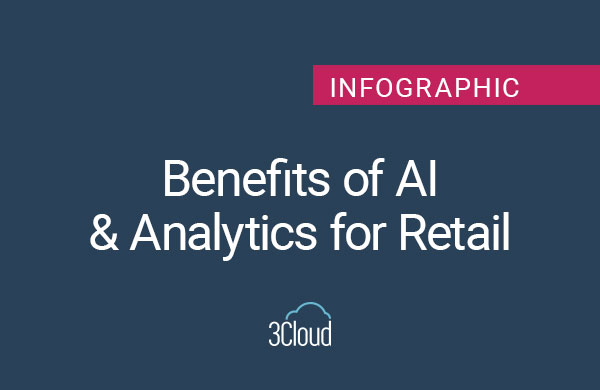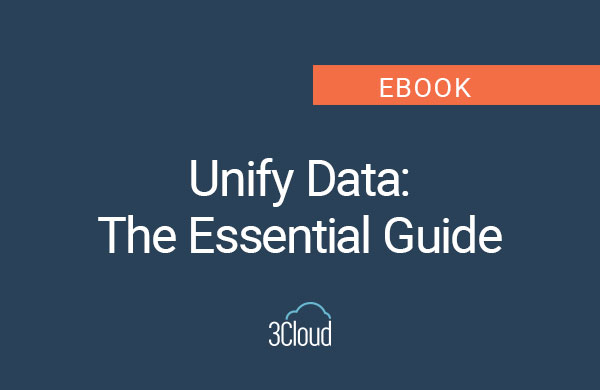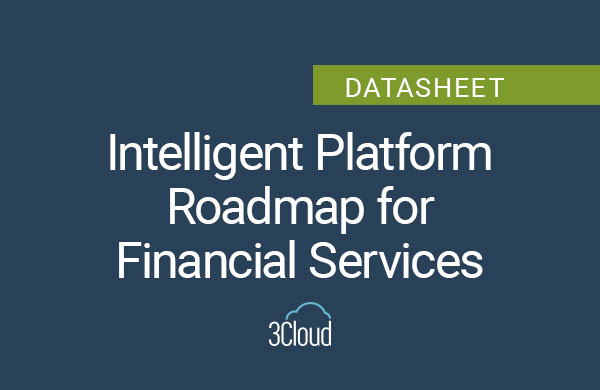In the Era of AI, businesses are looking to their data to drive innovation, improve decision-making, and enhance operational efficiency. However, the proliferation of disparate data sources, siloed systems, and legacy infrastructures often hinders the integration and utilization of data, and the old adage of ‘Garbage In, Garbage Out’ has never been more relevant than when AI learns from that data! Enter Microsoft Fabric, a comprehensive platform for data management and analytics, offering a solution to this challenge by enabling the creation of a unified data architecture that supports AI-driven insights.
At 3Cloud, we help organizations respond to the Era of AI from a position of strength – armed with the perspective, alignment, technical expertise, and governance necessary to generate transformative value. Establishing a comprehensive Intelligent Platform is a critical step in this journey, and perhaps the most significant focus is on building out a unified data platform capable of serving the right data at the right time to facilitate a multitude of solutions and use cases, and doing so in a secure, performant, and agile fashion.
3Cloud’s Unified Data Platform for AI in Fabric
To build a unified data architecture for AI using Microsoft Fabric, 3Cloud provides a series of frameworks and accelerators that allow you to democratize your data to enable AI use cases in managed through technology married with your company’s Data Governance standards:
- Assessment and Planning: The first step is to assess the current data landscape, identifying the key data sources, systems, and processes that need to be integrated. 3Cloud provides a customized Roadmap engagement to help identify use cases and identify the key data that unlocks them.
- Data Ingestion and Integration: Once the data sources are identified, the next step is to set up data pipelines for ingestion. 3Cloud provides accelerators engineered specifically for Fabric including Data Lake Hydrator. Our ingestion and integration processes are Meta-Data Driven which allows you to add new data into OneLake without requiring code or new processes. This enables you to focus on your businesses data definitions and data quality standards.
- Data Storage and Management: With the data ingested, organizations need to design a storage architecture that supports their AI and analytics workloads. 3Cloud utilizes a Medallion Architecture designed around Fabric which allows for minimal storage and clearly defined data layers built for data quality, security and advanced analytics. This architecture supports a data mesh architecture with minimal infrastructure overhead.
- Processing and Analytics: The unified data architecture should support both batch and real-time processing to meet the needs of different AI applications. 3Cloud’s Unified Integration Framework supports both orchestrated integration through Data Factory and streaming data engineered with Fabric’s Real-Time Intelligence.
- AI Integration and Deployment: Once the data architecture is in place, the focus shifts to building and deploying AI models. Microsoft Fabric’s integration with Azure Machine Learning enables organizations to leverage advanced AI tools and frameworks. The unified data architecture ensures that AI models have seamless access to the data they need, facilitating rapid experimentation and deployment.
- Monitoring and Optimization: A critical aspect of maintaining a unified data architecture is ongoing monitoring and optimization. 3Cloud utilizes both its Unified Integration Framework and Fabric’s built-in monitoring and optimization capabilities to provide visibility and clearly identifiable opportunities to ensure your solution is reliable, durable and available.
Why Microsoft Fabric?
Building a unified data architecture for AI using Microsoft Fabric offers several benefits:
- Scalability: Microsoft Fabric is built to scale, enabling organizations to handle growing data volumes and increasing AI workloads without compromising performance.
- Flexibility: The platform’s support for multiple storage and processing models allows organizations to tailor their data architecture to their specific needs, providing the flexibility to adapt to changing business requirements.
- Security and Compliance: Microsoft Fabric’s comprehensive data governance tools help organizations maintain data security and compliance, reducing the risk of data breaches and regulatory penalties.
- Accelerated AI Adoption: By providing a unified environment for data and AI, Microsoft Fabric accelerates the development and deployment of AI solutions, enabling organizations to realize value from their AI investments more quickly.
Conclusion
Microsoft Fabric is a powerful platform that enables organizations to build a unified data architecture for AI. By integrating data from diverse sources, providing scalable storage and processing capabilities, and supporting advanced AI tools, Microsoft Fabric helps organizations unlock the full potential of their data. As businesses continue to invest in AI-driven innovation, a unified data architecture built on Microsoft Fabric will be critical to achieving success. Contact us to get started today.




